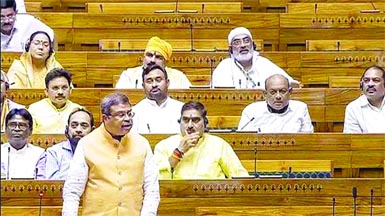New Delhi (TIP)- The ongoing monsoon session of the Parliament in Lok Sabha witnessed a heated debate between the Opposition parties and ruling dispensation over the recent changes made to the National Council of Educational Research and Training (NCERT) syllabus.
The discussion took place during the debate on the demand for grants for the education ministry in Lok Sabha which was later passed through voice vote without any changes.
The All India Majlis-E-Ittehadul Muslimeen (AIMIM) MP Asaduddin Owaisi questioned the Bharatiya Janata Party (BJP)-led central government for fudging with the existing textbooks.
“Direct connection can be drawn between policies of the government and the continued education backwardness of the Muslims. In both higher education and schooling, Muslims want to get formal education but because of government apathy and negligence, the Muslim dropout of education system is sooner than children of any other community”, Owaisi said.
Congress MP and Whip in the House Mohammad Jawed also reiterated that Mughals’ historical presence cannot be erased merely by removing their names from textbooks. “Mughals were here for 330 years, they are not going to be removed just because you remove the name,” Jawed said. “If there were no Muslims in this country, the BJP could not have opened its account”, he added.
He continued his verbal tirade asking BJP to not discriminate and criticised the government over the recent cases of paper leaks.
“Outside Parliament, test papers are getting leaked and inside Parliament, the roof is leaking…”, he said.
Not only the textbook revision issue, but the Opposition also tried to corner the government on the National Education Policy 2020 (NEP) too.
Reacting to the opposition party MPs’ comments, Union education minister Dharmendra Pradhan defended the NEP, saying that it is based on principles of accountability, affordability, accessibility, equitability, and quality.
He highlighted the expansion in spending on higher education by 63% and primary education by 40% since 2013-14.
Pradhan also noted that the new education pattern includes a 5+3+3+4 system and said that there has been an increase in female teachers from 36 lakh to 48 lakh.
Addressing the controversy over the NCERT syllabus, Pradhan said, “Western influence in the Indian education system has to be removed?”, he said. “The National Education Policy is not just a 60-page policy document. It is a philosophical element for the rebuilding of India, enhancing brotherhood in the world, and solving global problems. The entire nation unanimously accepts it today”, Pradhan said. Source: HT
Oppn targets govt over NCERT textbooks revision, NEP

Union education minister Dharmendra Pradhan speaks in the Lok Sabha during the Monsoon session of Parliament. (PTI photo)